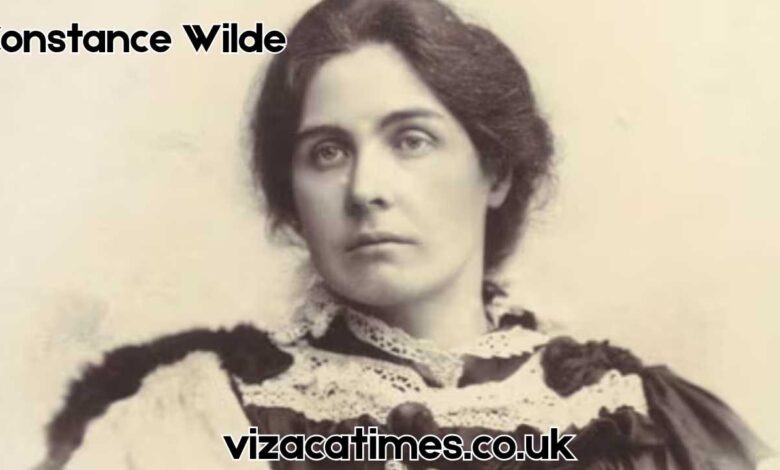Constance Wilde: A Life of Strength, Grace, and Silent Struggle

Introduction to Constance Wilde
The keyword Constance Wilde evokes the memory of a woman who lived with quiet dignity during a time of social upheaval and personal heartbreak. Best known as the wife of Oscar Wilde, Constance Wilde was far more than a Victorian spouse; she was a writer, advocate, and thinker in her own right. Her life offers a nuanced portrait of a woman navigating the complexities of fame, societal expectations, and private betrayal with composure and resolve. The story of Constance Wilde is one of personal courage overshadowed by cultural myths that often minimized her true individuality.
Early Life and Intellectual Formation
Constance Wilde was born into a well-educated family, where literature and learning were deeply valued. She developed a strong intellectual curiosity early on, which later influenced her interest in writing and social causes. Before becoming Constance Wilde, she had already begun shaping her voice through essays and correspondence. Her early life was marked by the privileges of education but also the constraints of a society that limited women’s agency. The keyword Constance Wilde thus represents both aspiration and restriction, capturing the dual nature of her early experience.
Marriage to Oscar Wilde
Constance married Oscar Wilde at a time when his wit and charm were gaining wide acclaim. Their union appeared, at least initially, to be a partnership built on mutual respect and shared cultural interests. She supported Oscar’s early career and helped manage their household and public image. During the early years of their marriage, Constance Wilde maintained a strong presence in intellectual circles, hosting salons and engaging with the artistic elite of London. However, as Oscar’s fame grew, so did the distance in their relationship—something that would later define much of Constance Wilde’s private suffering.
Personal Writing and Public Engagement
Though often overshadowed by her husband’s literary fame, Constance Wilde was a writer in her own right. She contributed articles to women’s publications and wrote on issues such as dress reform and children’s welfare. Her voice was thoughtful and measured, reflecting both her education and her sensitivity to the social issues of her time. The keyword Constance Wilde, therefore, also stands for female authorship and advocacy—roles that were frequently minimized in Victorian society. Her ability to speak through her writing, despite being sidelined in public memory, highlights her inner strength and resilience.
Involvement in the Dress Reform Movement
One of Constance Wilde’s most notable contributions was her involvement in the rational dress movement, which sought to free women from the restrictive fashion norms of the 19th century. She believed that women should not be forced to endure physical discomfort to conform to arbitrary standards of beauty. As a public speaker and writer on the subject, Constance Wilde advanced ideas that were both practical and symbolic. The keyword Constance Wilde is closely associated with this movement, showing her role as a progressive voice at a time when few women dared to challenge the status quo.
The Scandal and Its Aftermath
The greatest test of Constance Wilde’s character came during the trials of Oscar Wilde, when his relationship with another man became public, sparking one of the most notorious scandals in British history. Constance Wilde chose to protect her children and retreat from public life rather than fan the flames of controversy. She changed her surname to Holland, moved to the European continent, and lived with quiet dignity despite personal humiliation. The keyword Constance Wilde here reveals a story of restraint, resilience, and maternal commitment that rarely receives full recognition.
Motherhood and Emotional Resilience
As a mother, Constance Wilde placed her children’s needs above all else. She ensured that they received quality education and were shielded from the harsh glare of scandal. Her correspondence and actions during this period reflect a woman determined to preserve their future even at great personal cost. The emotional toll was immense, yet she managed to maintain stability and provide a sense of normalcy in the face of adversity. The keyword Constance Wilde, in this context, becomes a symbol of maternal sacrifice and emotional fortitude.
Health Decline and Final Years
In her later years, Constance Wilde’s health began to decline. The emotional weight of her experiences, combined with physical ailments, gradually wore her down. She underwent surgery and suffered from complications that would ultimately lead to her untimely death in her early forties. She died far from the literary circles that once celebrated her, and her legacy became largely overshadowed by her husband’s. Still, the keyword Constance Wilde endures as a quiet yet powerful reminder of her humanity, grace, and enduring relevance.
Historical Reappraisal and Legacy
In recent years, there has been a growing effort to reassess Constance Wilde’s life with greater accuracy and empathy. Biographers, historians, and feminist scholars have highlighted her intelligence, activism, and unrecognized contributions to literary culture. The keyword Constance Wilde is no longer just an appendage to her husband’s fame—it is a reference to a complex individual who deserves her own place in historical memory. Her life is increasingly seen as a testament to personal integrity and the quiet power of endurance.
The Enduring Importance of Constance Wilde
The legacy of Constance Wilde lies not in loud declarations or public accolades but in the subtle strength she displayed in every phase of her life. From her intellectual pursuits and reform work to her dignified response to personal tragedy, Constance Wilde offers an inspiring example of resilience. Her story reminds us that history often overlooks the quieter figures whose contributions, though less dramatic, are equally significant. The keyword Constance Wilde today symbolizes not just the wife of a famous writer, but a woman of character and conviction.
Also Read : Exploring the Life and Impact of Marianne Kilonzi, ??



